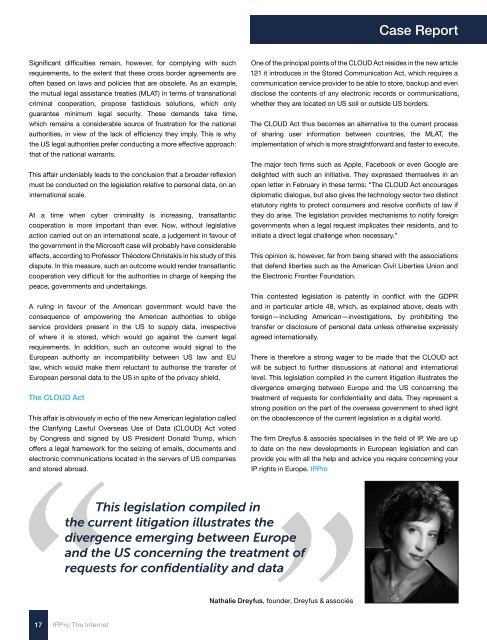IPPro The Internet Issue 140
In this issue Matthew Bassiur, head of IP enforcement at Alibaba, gives an update of the e-commerce company’s enforcement efforts.
In this issue Matthew Bassiur, head of IP enforcement at Alibaba, gives an update of the e-commerce company’s enforcement efforts.
Create successful ePaper yourself
Turn your PDF publications into a flip-book with our unique Google optimized e-Paper software.
Case Report<br />
Significant difficulties remain, however, for complying with such<br />
requirements, to the extent that these cross border agreements are<br />
often based on laws and policies that are obsolete. As an example,<br />
the mutual legal assistance treaties (MLAT) in terms of transnational<br />
criminal cooperation, propose fastidious solutions, which only<br />
guarantee minimum legal security. <strong>The</strong>se demands take time,<br />
which remains a considerable source of frustration for the national<br />
authorities, in view of the lack of efficiency they imply. This is why<br />
the US legal authorities prefer conducting a more effective approach:<br />
that of the national warrants.<br />
This affair undeniably leads to the conclusion that a broader reflexion<br />
must be conducted on the legislation relative to personal data, on an<br />
international scale.<br />
At a time when cyber criminality is increasing, transatlantic<br />
cooperation is more important than ever. Now, without legislative<br />
action carried out on an international scale, a judgement in favour of<br />
the government in the Microsoft case will probably have considerable<br />
effects, according to Professor Théodore Christakis in his study of this<br />
dispute. In this measure, such an outcome would render transatlantic<br />
cooperation very difficult for the authorities in charge of keeping the<br />
peace, governments and undertakings.<br />
A ruling in favour of the American government would have the<br />
consequence of empowering the American authorities to oblige<br />
service providers present in the US to supply data, irrespective<br />
of where it is stored, which would go against the current legal<br />
requirements. In addition, such an outcome would signal to the<br />
European authority an incompatibility between US law and EU<br />
law, which would make them reluctant to authorise the transfer of<br />
European personal data to the US in spite of the privacy shield.<br />
<strong>The</strong> CLOUD Act<br />
This affair is obviously in echo of the new American legislation called<br />
the Clarifying Lawful Overseas Use of Data (CLOUD) Act voted<br />
by Congress and signed by US President Donald Trump, which<br />
offers a legal framework for the seizing of emails, documents and<br />
electronic communications located in the servers of US companies<br />
and stored abroad.<br />
One of the principal points of the CLOUD Act resides in the new article<br />
121 it introduces in the Stored Communication Act, which requires a<br />
communication service provider to be able to store, backup and even<br />
disclose the contents of any electronic records or communications,<br />
whether they are located on US soil or outside US borders.<br />
<strong>The</strong> CLOUD Act thus becomes an alternative to the current process<br />
of sharing user information between countries, the MLAT, the<br />
implementation of which is more straightforward and faster to execute.<br />
<strong>The</strong> major tech firms such as Apple, Facebook or even Google are<br />
delighted with such an initiative. <strong>The</strong>y expressed themselves in an<br />
open letter in February in these terms: “<strong>The</strong> CLOUD Act encourages<br />
diplomatic dialogue, but also gives the technology sector two distinct<br />
statutory rights to protect consumers and resolve conflicts of law if<br />
they do arise. <strong>The</strong> legislation provides mechanisms to notify foreign<br />
governments when a legal request implicates their residents, and to<br />
initiate a direct legal challenge when necessary.”<br />
This opinion is, however, far from being shared with the associations<br />
that defend liberties such as the American Civil Liberties Union and<br />
the Electronic Frontier Foundation.<br />
This contested legislation is patently in conflict with the GDPR<br />
and in particular article 48, which, as explained above, deals with<br />
foreign—including American—investigations, by prohibiting the<br />
transfer or disclosure of personal data unless otherwise expressly<br />
agreed internationally.<br />
<strong>The</strong>re is therefore a strong wager to be made that the CLOUD act<br />
will be subject to further discussions at national and international<br />
level. This legislation compiled in the current litigation illustrates the<br />
divergence emerging between Europe and the US concerning the<br />
treatment of requests for confidentiality and data. <strong>The</strong>y represent a<br />
strong position on the part of the overseas government to shed light<br />
on the obsolescence of the current legislation in a digital world.<br />
<strong>The</strong> firm Dreyfus & associés specialises in the field of IP. We are up<br />
to date on the new developments in European legislation and can<br />
provide you with all the help and advice you require concerning your<br />
IP rights in Europe. <strong>IPPro</strong><br />
This legislation compiled in<br />
the current litigation illustrates the<br />
divergence emerging between Europe<br />
and the US concerning the treatment of<br />
requests for confidentiality and data<br />
Nathalie Dreyfus, founder, Dreyfus & associés<br />
17 <strong>IPPro</strong> <strong>The</strong> <strong>Internet</strong>







